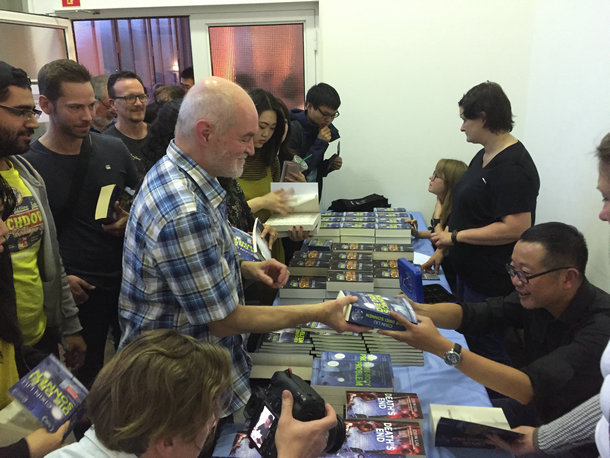The science of a good story
By Mei Jia | China Daily | Updated: 2018-10-26 07:39

Liu's foreign readers also know him well.
Oregon-based writer and editor Erik Henriksen says in his review of the book: "As usual, Liu is a master at evoking awe and horror at the scale and strangeness of our universe-but here, he also lays bare why we study it. He's more interested in, and better at, cracking open the big ideas of space and time."
Bloomberg published a report under the headline "China uses sci-fi to try to spark a tech boom", after meeting Liu at the World Conference on Science Literacy in Beijing in late September.
According to Yao Haijun, the editor of Science Fiction World, there were an estimated 80 million sci-fi readers in the country, while there were only about 200 sci-fi writers in 2016.
Yao also says the country published just one-twentieth of the volume of sci-fi titles compared to the volume published in the United States where 1,797 writers were active in the genre, between 2011 and 2016.
Liu says the core of his novels is sci-fi fantasy; less important elements are stories and characters.
He used to sit for long hours, contemplating new ideas or constructing his stories. Now, in recent years, he is able to get in touch with-and discuss things with-more scientists.
"Science-fiction writers may consider many angles on a subject, but they always choose to write about the least likely," he says in the afterword. "It's the seemingly unlikeliest of the possibilities in science-fiction stories that tend to become reality. So, in the end, who knows."
Lindsey Hall, senior editor with Tor/Forge Books, the US publisher of Liu's novels, tells China Daily that Ball Lightning is a great read for fans of the Three Body Problem, as well as those who haven't yet read the trilogy.
"We're very open to working with more Chinese science-fiction authors, and the success of The Three Body Problem has helped make that possible," Hall explains, adding that the company is launching Chen Qiufan's Waste Tide in English in April 2019.
"The issues Chinese science-fiction are confronting are issues we're all facing-questions about the environment, the economy, recycling; how to find family and love and hold on to your heritage in an ever-changing modern world. These are questions that are felt worldwide, and we hope to continue showcasing the breadth and depth of this rich genre."
Officially titled the Remembrance of Earth's Past trilogy-which contains The Three Body Problem, The Dark Forest and Death's End-in the English-language market, it had sold 760,000 copies by the end of 2017.
Worldwide, the trilogy has been published in 11 languages and has four more yet to come, making it a global phenomenon. The original Chinese-language version had sold 4 million copies by July 2016.
Liu says the success of the trilogy is an unexpected coincidence, and the sales number of Ball Lightning does not mean that a similar miracle will happen again. But, in the six weeks since its release, about 9,000 copies have been sold.
Another of Liu's books translated into English is The Wandering Earth, a collection of 11 short stories published in October 2017.
As Hall says, Liu has opened a gateway for more Chinese scifi writers to reach a wider global audience, but that would not be possible without professionals like Joel Martinsen.
The 40-year-old, Beijing-based translator finished The Dark Forest and Ball Lightning.
"The novel, my favorite by China's most popular science-fiction writer, is one that I've been wanting to translate since I first read it many years ago. I'm excited about tackling the challenges posed by the book's inventive physics, and doing justice to its fast-paced story of the pursuit of a scientific obsession," Martinsen says of Ball Lightning.
Liu says he has read through Martinsen's version and is satisfied.
Martinsen would surf the online forums where Liu would go, many years before they even met, and is known for appreciating contemporary Chinese literature.
Martinsen got a taste of the Chinese language in high school. After getting a bachelor's in mathematics from University of Maryland, he lived in Jilin province for three years before moving to Beijing and enrolling in Beijing Normal University.
He took a job at a media-intelligence company, before quitting and devoting himself fully to the translation of literature and, sometimes, film subtitles.
Besides Liu's novels, he has translated the work of Zhang Wei and Han Han.
"I feel familiar with many scenes depicted in Ball Lightning-the streets in Beijing and even the top of Taishan Mountain," Martinsen notes, adding that the challenges lie in the rendering of the scientific terms and phrases with precision.
Liu considers himself a "scifi fan turned writer". He majored in hydropower engineering at North China University of Water Resources and Electric Power, before working as an engineer in a power plant in Yangquan, Shanxi province, for 30 years. He left the plant in 2014 to join the local federation of literary and art circles.
In a place "that was the first place to get internet access in the whole province", as Liu says, his imagination went wild. He created his own worlds "to tell the romantic legends that have unfolded between man and the universe".
"I've always felt that the greatest and most beautiful stories in the history of humanity were not sung by wandering bards or written by playwrights and novelists," he says, "but told by science."
























